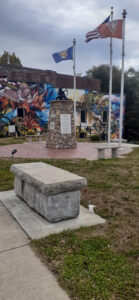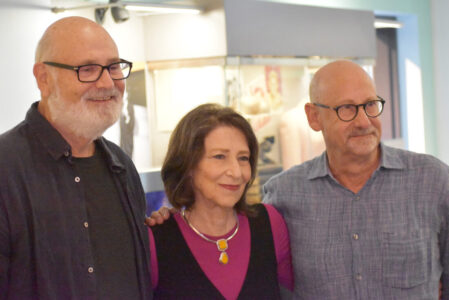150-year-old horror
Angola remembers victims, responders of railroad tragedy

OBSERVER Photos by Greg Fox Pictured is a special cancel commemorating the Angola Horror Railway Disaster, which is available at the Angola Post Office starting today.
- OBSERVER Photos by Greg Fox Pictured is a special cancel commemorating the Angola Horror Railway Disaster, which is available at the Angola Post Office starting today.
- OBSERVER Photo by Greg Fox Karen Wielinski, whose Clarence Center home was landed on by Flight 3407 in 2009, spoke at Sunday’s event.
- OBSERVER Photo by Greg Fox Pictured is the same bridge where the “Angola Horror” occurred in 1867. A bus tour showed visitors the site.
On Dec. 18, 1867, two cars of a New York express passenger train derailed and plummeted from a bridge over Big Sister Creek in Angola. One of those trains became consumed in a fiery blaze on the frozen creek below.
It was a horror beyond the likes of anything anyone could imagine. It was the Angola Horror.
“They were from all walks of life – teachers, shopkeepers, husbands, wives, babies, prominent people, people who were never known at the time and people who will never be known,” Charity Vogel noted. “It changed the lives of many more. Some who did not personally board the train that wrecked would lose people who did. Others … would have narrow escapes from peril and possible death.
“Others (including average citizens of Angola) would wake on that morning and not realize the day would present them the opportunity for incredible, heroic, selfless action, the frantic work to save lives, rescue men and women, find lost travelers.”

OBSERVER Photo by Greg Fox Karen Wielinski, whose Clarence Center home was landed on by Flight 3407 in 2009, spoke at Sunday’s event.
At least 50 people perished in the unspeakable nightmare. News of it reverberated across the nation, resulting in sweeping safety changes for a major form of transportation.
On Sunday, nearly 150 years later to the day, Angola stopped to remember.
Hundreds gathered in the New Angola Theater on North Main Street in the village to learn more about the Angola Horror and hear from several speakers, as part of an event put on by the Angola Horror Sesquicentennial Committee. Vogel, who spent nearly a decade researching it for her book “The Angola Horror,” was one of those speakers.
“Now, 150 years from the fate of the events in Angola, this historic, horrific, significant American event now seems closer and more tangible than ever,” she remarked. “People now talk about the Angola Horror and learn about it, and not only on anniversaries or vague and insubstantial ways. The wreck has become part of the fabric of our nation.”
Karen Wielinski’s tragedy does not relate to the Angola Horror directly, but it certainly mirrors it. Wielinski lost her husband Doug when Continental Flight 3407 crash-landed on her Clarence Center house on Feb. 12, 2009, killing 50 passengers.

OBSERVER Photo by Greg Fox Pictured is the same bridge where the “Angola Horror” occurred in 1867. A bus tour showed visitors the site.
“It amazes me that after pulling myself out of debris that night, the sight I encountered did not make me hysterical,” Wielinski told audience members. “I looked and the entire house was gone. My psychologist tells me I was in shock, which makes a lot of sense, but I think, too, the fact that as I came out and turned, I saw my daughter just yards away from me. I think the mother mode in me kicked in, and that too helped me to think that I had stayed calm.”
Wielinski wrote a book, “One on the Ground,” to tell her story of survivorship, to pay tribute to her late husband and to help give comfort to others experiencing hardship.
Through tragedy, there are stories of hope and positivity, and Wielinski reminded audience members of that by sharing the comfort and solace she finds in knowing her daughters are alive and well.
“Although my book does reveal some of the horror that was caused by 3407, I like to think it is first and foremost a celebration of people’s lives and their spirit that continues to sustain those they left behind,” she added. “It is still easy to fall into despair over the loss of my husband and the life that we loved, but I am learning that memories can be incorporated into my life and that will enrich my future.
“I like to think those who survived the Angola wreck also learned to embrace their second chance at life.”
Like the Angola Horror, the tragedy of Flight 3407 led to sweeping reforms in transportation safety. This includes a disclosure on a passenger’s ticket when their flight has a regional airline, fatigue regulations for pilots and an increase in the number of training hours for pilots flying for regional airlines, from 250 hours to 1,500 hours.
“Great strides have been made,” Wielinski noted.
Members of the Angola Horror Sesquicentennial Committee include Caryl Youngers, Robert Barrett, Dennis Kingan and Patty Friend.
A remembrance service in recognition of the citizens who rushed to the aid of the Angola Horror victims will take place today at 7 p.m. in the First Congregational Church, 132 Main St. Mark Bouvier, owner of the historic Southwick house, will hold a presentation. Refreshments will follow. This event is sponsored by the Friends of the Village.
Twitter: @gfoxnews







